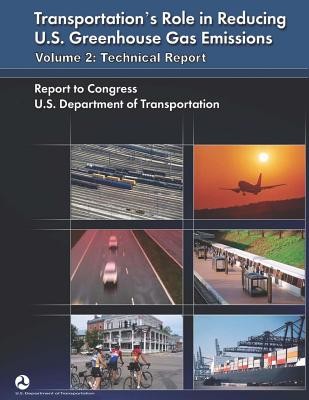
- We will send in 10–14 business days.
- Author: U S Department of Transportation
- Publisher: CreateSpace Independent Publishing Platform
- Year: 2015
- Pages: 464
- ISBN-10: 1508526869
- ISBN-13: 9781508526865
- Format: 21.6 x 28 x 2.4 cm, softcover
- Language: English
- SAVE -10% with code: EXTRA
Transportation's Role in Reducing U.S. Greenhouse Gas Emissions (e-book) (used book) | bookbook.eu
Reviews
Description
Transportation is a significant contributor to national greenhouse gas emissions, and can be part of the Nation's solution to the climate change challenge. The Energy Independence and Security Act (December 2007) called upon the U.S. Department of Transportation (DOT), in coordination with the U.S. Environmental Protection Agency (EPA) and in consultation with the U.S. Global Change Research Program (USGCRP), to conduct a study of the impact of the Nation's transportation system on climate change and strategies to mitigate the effects by reducing greenhouse gas emissions. The study also considers fuel savings and air pollution reduction from these measures. Transportation's Role in Reducing U.S. Greenhouse Gas Emissions is a report to Congress from the U.S. Department of Transportation (DOT) on the potential of transportation strategies to contribute to greenhouse gas reductions. Transportation has a significant impact on national greenhouse gas emissions, and transportation can be part of the nation's solution to the climate change challenge. The Energy Independence and Security Act (December 2007) called upon DOT, in consultation with the U.S. Environmental Protection Agency (EPA) and the U.S. Global Change Research Program (USGCRP), to conduct a study of the impact of the Nation's transportation system on climate change and strategies to mitigate the effects by reducing greenhouse gas emissions from transportation. The study is also to consider fuel savings and air pollution reduction from these measures. This report responds to that directive. Volume 1: Synthesis Report provides an overview of transportation's contribution to greenhouse gas emissions (GHG), analyzes the effectiveness of various strategies available to reduce GHGs from the transportation sector, discusses the role of DOT planning and funding programs in providing a framework for strategic action on climate change, and concludes with five policy actions that Congress may wish to consider. Volume 2: Technical Report provides the technical basis for the summary material and recommendations in Volume 1. This volume, Volume 2, contains detailed technical discussions of the four groups of strategies that can contribute to reducing the carbon footprint of the transportation sector. Each group of strategies is evaluated based on a set of factors including magnitude of GHG reduction, timing of impacts, cost, cobenefits (including fuel savings and air quality), implications for other DOT goals, impacts on infrastructure financing, and feasibility and implementation considerations.
EXTRA 10 % discount with code: EXTRA
The promotion ends in 20d.10:33:03
The discount code is valid when purchasing from 10 €. Discounts do not stack.
- Author: U S Department of Transportation
- Publisher: CreateSpace Independent Publishing Platform
- Year: 2015
- Pages: 464
- ISBN-10: 1508526869
- ISBN-13: 9781508526865
- Format: 21.6 x 28 x 2.4 cm, softcover
- Language: English English
Transportation is a significant contributor to national greenhouse gas emissions, and can be part of the Nation's solution to the climate change challenge. The Energy Independence and Security Act (December 2007) called upon the U.S. Department of Transportation (DOT), in coordination with the U.S. Environmental Protection Agency (EPA) and in consultation with the U.S. Global Change Research Program (USGCRP), to conduct a study of the impact of the Nation's transportation system on climate change and strategies to mitigate the effects by reducing greenhouse gas emissions. The study also considers fuel savings and air pollution reduction from these measures. Transportation's Role in Reducing U.S. Greenhouse Gas Emissions is a report to Congress from the U.S. Department of Transportation (DOT) on the potential of transportation strategies to contribute to greenhouse gas reductions. Transportation has a significant impact on national greenhouse gas emissions, and transportation can be part of the nation's solution to the climate change challenge. The Energy Independence and Security Act (December 2007) called upon DOT, in consultation with the U.S. Environmental Protection Agency (EPA) and the U.S. Global Change Research Program (USGCRP), to conduct a study of the impact of the Nation's transportation system on climate change and strategies to mitigate the effects by reducing greenhouse gas emissions from transportation. The study is also to consider fuel savings and air pollution reduction from these measures. This report responds to that directive. Volume 1: Synthesis Report provides an overview of transportation's contribution to greenhouse gas emissions (GHG), analyzes the effectiveness of various strategies available to reduce GHGs from the transportation sector, discusses the role of DOT planning and funding programs in providing a framework for strategic action on climate change, and concludes with five policy actions that Congress may wish to consider. Volume 2: Technical Report provides the technical basis for the summary material and recommendations in Volume 1. This volume, Volume 2, contains detailed technical discussions of the four groups of strategies that can contribute to reducing the carbon footprint of the transportation sector. Each group of strategies is evaluated based on a set of factors including magnitude of GHG reduction, timing of impacts, cost, cobenefits (including fuel savings and air quality), implications for other DOT goals, impacts on infrastructure financing, and feasibility and implementation considerations.


Reviews